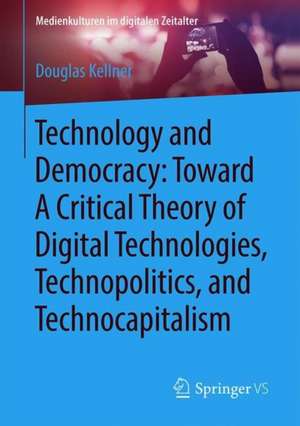Technology and Democracy: Toward A Critical Theory of Digital Technologies, Technopolitics, and Technocapitalism: Medienkulturen im digitalen Zeitalter
Autor Douglas Kellneren Limba Engleză Paperback – 7 oct 2021
Preț: 469.41 lei
Preț vechi: 552.25 lei
-15% Nou
Puncte Express: 704
Preț estimativ în valută:
89.85€ • 97.63$ • 75.52£
89.85€ • 97.63$ • 75.52£
Carte tipărită la comandă
Livrare economică 21 aprilie-05 mai
Preluare comenzi: 021 569.72.76
Specificații
ISBN-13: 9783658317898
ISBN-10: 3658317892
Pagini: 303
Ilustrații: VII, 303 p. 2 illus.
Dimensiuni: 148 x 210 mm
Greutate: 0.37 kg
Ediția:1st ed. 2021
Editura: Springer Fachmedien Wiesbaden
Colecția Springer VS
Seria Medienkulturen im digitalen Zeitalter
Locul publicării:Wiesbaden, Germany
ISBN-10: 3658317892
Pagini: 303
Ilustrații: VII, 303 p. 2 illus.
Dimensiuni: 148 x 210 mm
Greutate: 0.37 kg
Ediția:1st ed. 2021
Editura: Springer Fachmedien Wiesbaden
Colecția Springer VS
Seria Medienkulturen im digitalen Zeitalter
Locul publicării:Wiesbaden, Germany
Cuprins
Introduction: Technology and the Demands of Democracy.- Digital Technologies and Alienation.- The Media, Democracy, and Spectacle.- Intellectuals, Citizens, and Digital Technologies in a New Era of Struggle.- Globalization, Technopolitics, and Revolution.- Virilio, War, and Technology.- Vicissitudes of High-Tech War.- Kubrick’s 2001 and Visions of Techno-Dystopia.- Digital Technologies, Multi-Literacies, and Democracy: Toward a Reconstruction of Education.
Recenzii
“This book is a much needed and valuable addition to the literature on working towards a theory of technology and a provocative starting point for further theorisation.” (Amy Hanna, Postdigital Science and Education, Vol. 5 (1), 2023)
Notă biografică
Douglas Kellner works at the intersection of "third generation" critical theory in the tradition of the Frankfurt Institute for Social Research, or Frankfurt School and in cultural studies in the tradition of the Birmingham Centre for Contemporary Cultural Studies. He is currently the George Kneller Chair in the Philosophy of Education in the Graduate School of Education and Information Studies at the University of California, Los Angeles.
Textul de pe ultima copertă
As we enter a new millennium, it is clear that we are in the midst of one of the most dramatic technological revolutions in history that is changing everything from the ways that we work, communicate, participate in politics, and spend our leisure time. The technological revolution centers on computer, information, communication, and multimedia technologies, is often interpreted as the beginnings of a knowledge or information society, and therefore ascribes technologies a central role in every aspect of life. This Great Transformation poses tremendous challenges to critical social theorists, citizens, and educators to rethink their basic tenets, to deploy the media in creative and productive ways, and to restructure the workplace, social institutions, and schooling to respond constructively and progressively to the technological and social changes that we are now experiencing.
The Author
Douglas Kellner works at the intersection of "third generation" critical theory in the tradition of the Frankfurt Institute for Social Research, or Frankfurt School and in cultural studies in the tradition of the Birmingham Centre for Contemporary Cultural Studies. He is currently the George Kneller Chair in the Philosophy of Education in the Graduate School of Education and Information Studies at the University of California, Los Angeles.
The Author
Douglas Kellner works at the intersection of "third generation" critical theory in the tradition of the Frankfurt Institute for Social Research, or Frankfurt School and in cultural studies in the tradition of the Birmingham Centre for Contemporary Cultural Studies. He is currently the George Kneller Chair in the Philosophy of Education in the Graduate School of Education and Information Studies at the University of California, Los Angeles.
Caracteristici
The technology revolution and how it changes our lives - towards a new Critical Theory Challenges to critical social theorists, citizens, and educators Central texts of one of the best known expert











